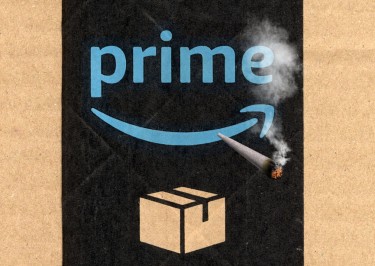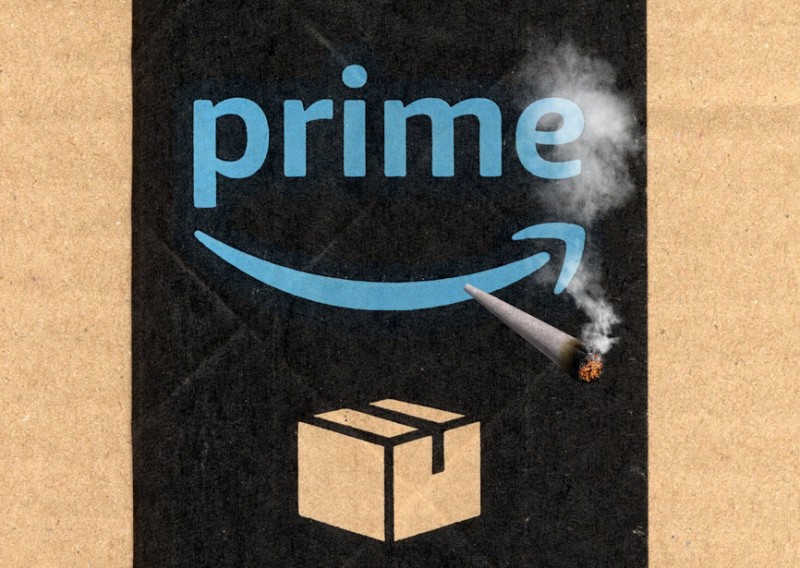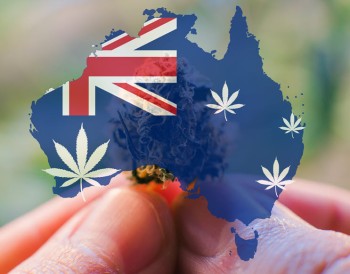Why Amazon Will Suck at Selling Weed – Culture, Web-Traffic, and Margin Compression

Culture, web-traffic, and relentless margin compression will make marijuana a tough sell for Amazon.
One grand vision of cannabis in future has all of us using Amazon Prime to get our weed delivered in 48 hours of less. But before we gnash our teeth and cringe, the “Evil Empire” as known by Amazon vendors, or Amazon to the retail consumer, will have some hurdles to overcome before they become America’s new weed dealer.
After interviewing Amazon employees and DSPs, delivery services partners, the ones who actually run those big blue vans all over North America for Amazon, there will be obstacles for Amazon just trying to opening up a pot shop and turning it into sneakers, tablets, food, paper towel, and diapers.
First and foremost is the culture. Amazon logistics hires as many ex-military personnel as they can find to run their logistics operations, not exactly the weed-loving crew. While local area stations are run by ex-retail and consumer service managers hired by Amazon, the real meat of their management in logistics is military personnel The logic being that if they can move 100,000 troops and tanks around, they must be the best at figuring out how to move a package 1,200 miles in 48 hours. Many people don’t actually realize all those blue delivery vans with Amazon on the side that deliver your package are not actually owned by Amazon. Amazon outsources the last 20 miles of delivery to their DSPs, or delivery service partners. DSPs are independent transportation companies that take on all the risk and liabilities of delivering Amazon packages the last 20 miles in exchange for the fact they never have to go out and find new customers, as Amazon will fill the van with Amazon package each morning to be delivered that day.
A few things to remember about Amazon at this point, as Jeff Bezos said, “Your margins are my opportunity”. One, Amazon’s reputation as the “Evil Empire” is well founded among venders who deal with Amazon at every level, from cloud computing, to retailers on their shopping platform. They will always put profits over people, margins over livable wages, and if you don’t like it, pound sand, we are Amazon, tough baloney.
Two, if Amazon could run their own vans and do a good job with the military guys running it, they wouldn’t need to hire anyone else. The military guys are good and getting packages moved around, but not so good are running companies and dealing everyday business challenges. That is why they outsource it, because they can’t figure out a way to make it profitable on their own, because if they could do that, they would. Amazon culture is 100% reactive and not proactive at the DSP and station level, the opposite of current marijuana culture. The entire marijuana industry has to be proactive in dealing with state and Federal restrictions, whereas being reactive means you lose your license and plead in court for mercy.
After culture comes the second problem for Amazon, web traffic. One reason Amazon gets away with treating vendors in their store so poorly and with such bravado is that they know an Amazon-storefront is almost a necessary evil of doing retail business online. The same “if you don’t like it, leave” attitude Amazon gives many vendors won’t hold up in the marijuana industry. One, many websites that eventually will sell weed have plenty of traffic and high Google rankings. Weedmaps’ recent $1.5 billion valuation is a testament to what a big cannabis site can be worth with Federal legalization. Their books opened up to show $160 million in revenue with weed being Federally illegal still. You can guess at the math and valuation if Weedmaps could ship overnight orders to 50 states legally. The second biggest cannabis website, Leafly, is reported to be seeking a similar SPAC fund deal with a similar valuation. When the two biggest weed websites in the world are both looking for $1 billion valuation while weed is still ILLEGAL, image the internet forces and traffic that could be unleased with going public and weed becoming legal. Amazon won’t own this traffic game like they are used to in the retail world, the niche will be too big for them to capture more than 20% of any given market. Not saying that 20% won’t be a monster number if Amazon eventually gets in the weed game, but it won’t be market saturation like you see in some areas of over 80%.
One key to Amazon's store success is the customer reviews and star-ranking system, it installs social trust and reliablity in a consumer. Weedmaps, Leafly, and many other cananbis sites have a long head-start in customer reviews for stores, suppliers, and brands. Amazon will not have a day #1 advantage in this important area of social credibilty for vendors.
Third, the relentless business tactics that made Amazon one of most successful companies in the world will not fly well in the cannabis space. Squeezing every last person along the supply chain that you can for every last penny, not paying people a live-able wage at many warehouse positions, and a general cut-throat attitude won’t convince a generally fun loving, hippy DNA-culture to become extreme capitalist. Cannabis is just beginning its long road for social equity and economic empowerment candidates to enter the field. Package companies are now generally aware of their environmental footprints and looking into bio-degradable materials and recycling. There is now a concerted effort in many states to protect the small farmer and mico-license holder, flying in the face of profits at all costs and margin compression everywhere you can squeeze a company or human being.
As readers of our blog know, margin compression is coming to cannabis with Federal legalization, as many companies will be shell shocked to see how a simply efficient market of supply and demand brings down the prices created by a myriad of legal moats and state rules. The good news is that if margins are not big enough, Amazon isn’t interested in exploring that niche or those products. Would cannabis ever get to a small enough margin that Amazon would not spend too much time worrying about it? Too early to make that call, but with global legalization around the corner, not just US production, but worldwide production, you may see a point where even Jeff Bezos says, “No margins, no opportunity”.
Conclusion
Amazon’s culture is not complimentary to the marijuana industry’s roots and culture. Amazon will not have the lock on “internet retail traffic for weed”, as they do on so many other products and niches. Margin compression will loom as a big problem for the industry, and for a company that looks for high margins to come in and make a profit on, Amazon may not like what they see in future cannabis margins and profits. If the marijuana vendor is seeing massive margin compression, how can Amazon also find decent margins in listing his product and hosting it in their shipping centers. You can only bleed so much blood from a stone.
Remember, there is a reason Amazon Fresh will deliver you tomatoes and lettuce, but you aren’t actually eating Amazon grown tomatoes and lettuce. They can make a profit on one, but not the other.







